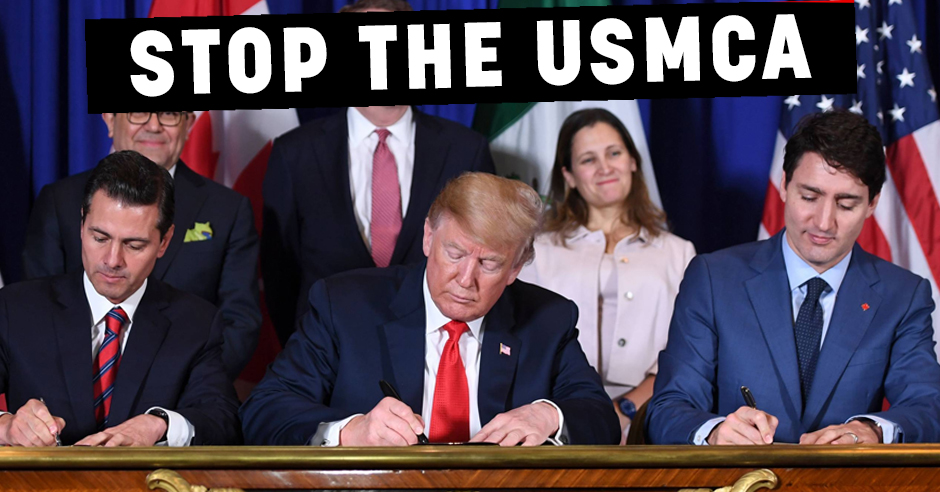
The Central Committee of the Communist Party of Canada calls on Parliament to refuse to ratify the USMCA, and we urge the labour and democratic movements to mobilize against this sellout of the interests of working people and farmers across Canada.

The Central Committee of the Communist Party of Canada calls on Parliament to refuse to ratify the USMCA, and we urge the labour and democratic movements to mobilize against this sellout of the interests of working people and farmers across Canada.
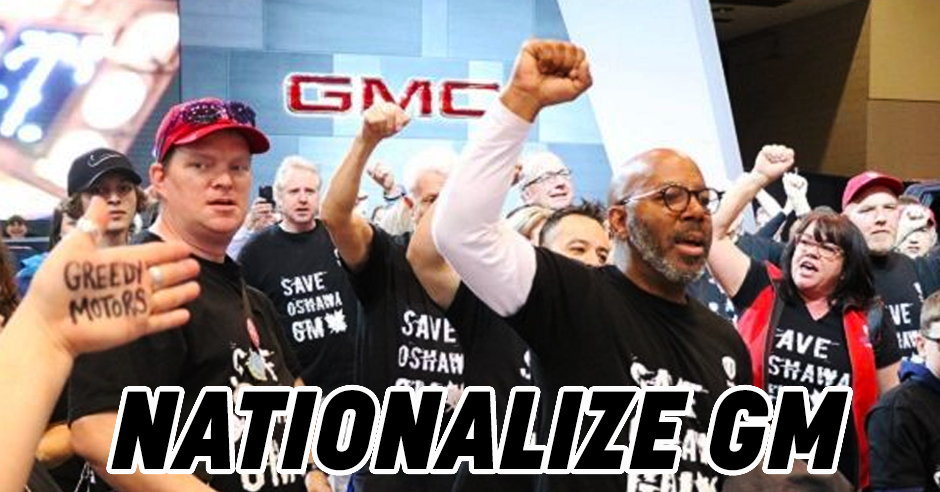 The Communist Party of Canada calls on the federal government to nationalize the General Motors operations in Canada under democratic control, as the only way to save the jobs of the 2,700 workers in Oshawa and the many jobs in parts plants and in the surrounding communities dependent on the income from workers in the factory.
The Communist Party of Canada calls on the federal government to nationalize the General Motors operations in Canada under democratic control, as the only way to save the jobs of the 2,700 workers in Oshawa and the many jobs in parts plants and in the surrounding communities dependent on the income from workers in the factory.
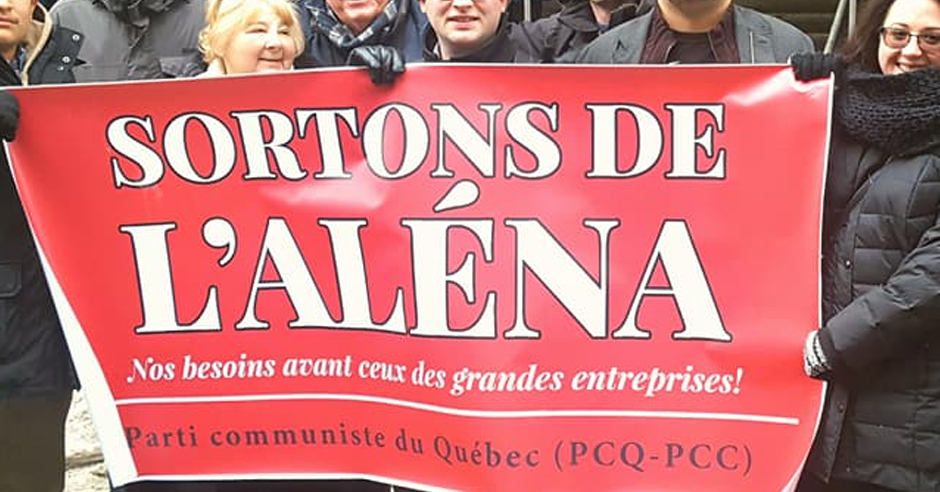 L’accord commercial ALENA-AEUMC annoncé par les États-Unis et le Canada a été revendiqué comme une victoire tant par Donald Trump que Justin Trudeau. Mais du point de vue des travailleuses et des travailleurs, cet accord ne fait que renforcer le pouvoir des entreprises capitalistes. Le Parti communiste du Canada demande au Parlement de refuser de ratifier l’AEUMC et exhorte les mouvements syndicaux et démocratiques à se mobiliser contre cette trahison des intérêts des travailleuses, des travailleurs, des agricultrices et des agriculteurs du Canada.
L’accord commercial ALENA-AEUMC annoncé par les États-Unis et le Canada a été revendiqué comme une victoire tant par Donald Trump que Justin Trudeau. Mais du point de vue des travailleuses et des travailleurs, cet accord ne fait que renforcer le pouvoir des entreprises capitalistes. Le Parti communiste du Canada demande au Parlement de refuser de ratifier l’AEUMC et exhorte les mouvements syndicaux et démocratiques à se mobiliser contre cette trahison des intérêts des travailleuses, des travailleurs, des agricultrices et des agriculteurs du Canada.
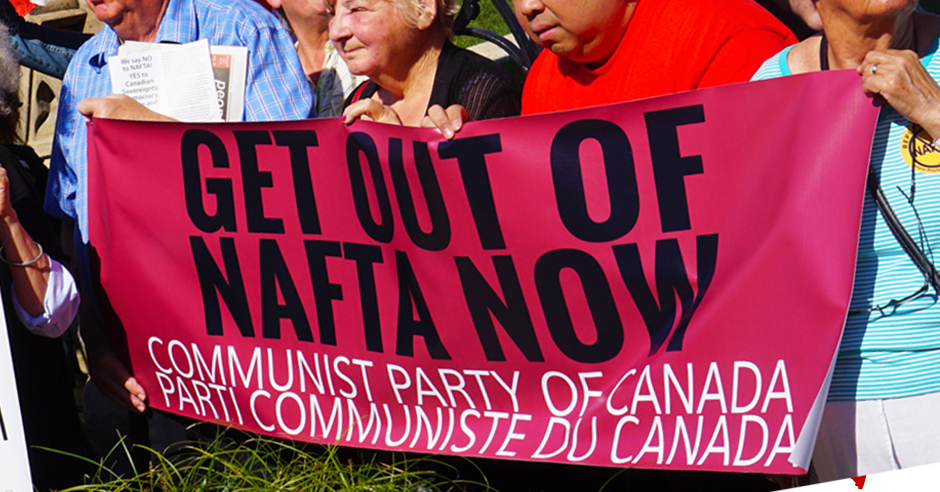 The NAFTA-USMCA agreement announced by the US and Canada has been claimed as a victory by both Donald Trump and Justin Trudeau; but for working people, this deal only tightens the corporate handcuffs. The Communist Party of Canada calls on Parliament to refuse to ratify the USMCA, and we urge the labour and democratic movements to mobilize against this sellout of the interests of working people and farmers in Canada.
The NAFTA-USMCA agreement announced by the US and Canada has been claimed as a victory by both Donald Trump and Justin Trudeau; but for working people, this deal only tightens the corporate handcuffs. The Communist Party of Canada calls on Parliament to refuse to ratify the USMCA, and we urge the labour and democratic movements to mobilize against this sellout of the interests of working people and farmers in Canada.
 The US government has held Canada hostage to its unilateral and one-sided trade policies for long enough, said Communist Party leader Liz Rowley responding to the US trade tariffs slapped on Canadian steel and aluminum May 31st.
The US government has held Canada hostage to its unilateral and one-sided trade policies for long enough, said Communist Party leader Liz Rowley responding to the US trade tariffs slapped on Canadian steel and aluminum May 31st.
“It’s time to get out of a one-sided trading relationship where the US coughs and Canada gets pneumonia,” said Rowley.
“US tariffs on steel and aluminum are going to cost thousands of Canadian workers their jobs and livelihoods in the mines and mills and in the Canadian industries and manufacturing sectors that they supply.
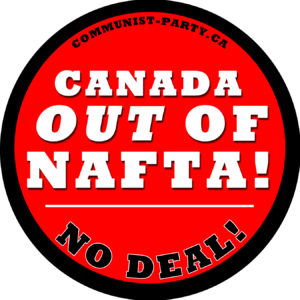 Submission to Global Affairs Canada’s NAFTA Consultations, by the Communist Party of Canada
Submission to Global Affairs Canada’s NAFTA Consultations, by the Communist Party of Canada
The Communist Party of Canada was among the first organizations in Canada to oppose the Canada-US Free Trade Agreement proposed by the Mulroney government in 1988 just months before that year’s federal election. Our opposition was based on our view that Canada’s sovereignty and independence was at stake with Canada’s escalated absorption into the US political, economic, and cultural orbit as the key feature and consequence of the FTA.
Our 38th Central Convention meets at a moment of escalating danger, from increasing war, environmental crisis and economic decay. As the systemic crisis of capitalism continues to deepen, and the effects of the 2008 economic meltdown continue to be felt, imperialist states and organizations are becoming increasingly aggressive. The standoff between nuclear armed states in Ukraine and the expanding war in Syria are powderkegs that threaten disaster. Millions upon millions of people in all parts of the world are being forced into poverty, hunger, homelessness and displacement.
But this is also a moment of rising working class and popular resistance. In all countries, albeit unevenly and with different characteristics, we see increased unity and mobilization. From online campaigns to mass demonstrations, general strikes, and political actions, people are using many different vehicles to advance these struggles. This is also expressed by the rising popularity of so-called democratic socialism, with all its contradictions, which is examined in detail in this report.
In Canada, the electoral defeat of the Conservatives in October 2015 represents a significant victory for the working class, Indigenous peoples, racialized communities, women, LGBTiQ communities, youth and students. While the victory of the Liberal party does not represent a break from the reactionary policies that are characteristic of the Canadian state, through a united, conscious political and organizational struggle we can open new space and possibilities in the fight for peace and disarmament, for immediate action to combat climate change, and for social equity and social justice. These advances can be realized – and can become concrete steps toward more fundamental change.
The 38th Central Convention of our Party follows a major political upheaval in the recent federal election, and a new escalation of the global economic crisis which emerged in 2007-08. Initially, the Canadian economy was buffered to some degree by exports of fossil fuels and other natural resources, and because Canada’s megabanks were somewhat less exposed to the collapse in value of leveraged (re-packaged) debt. Now, the dramatic collapse in energy prices and the Canadian dollar are causing new job losses and rapid increases in the cost of imported products. The working class is paying a heavy cost for the turmoil of the capitalist system.
Every government and advocates of “Free Trade Agreements” have dangled the illusion of jobs and prosperity. These have never materialized. Indeed the opposite is true. Hundreds of thousands of jobs have vanished through NAFTA, and experts predict at least another 50,000 jobs will be lost through CETA, the latest and most dangerous of these agreements.
Shrouded in secrecy, the Harper Conservative government, the European Union, and major trans‑national corporations recently concluded the final round of negotiations for the largest free‑trade agreement in Canada’s history since NAFTA. Although there have been setbacks in the German Parliament over the dispute mechanism, the Harper government are still pushing for a signing, at least in principle, in September 2014. CETA would take effect after it has been ratified by the EU member states, and also by the federal and provincial governments of Canada. This makes the fightback agenda very urgent; just as the MAI (Multilateral Agreement on Investments) was defeated, blocking CETA is still possible, through a strategy of mass mobilizations and by making this sellout a key issue in next year’s federal election.